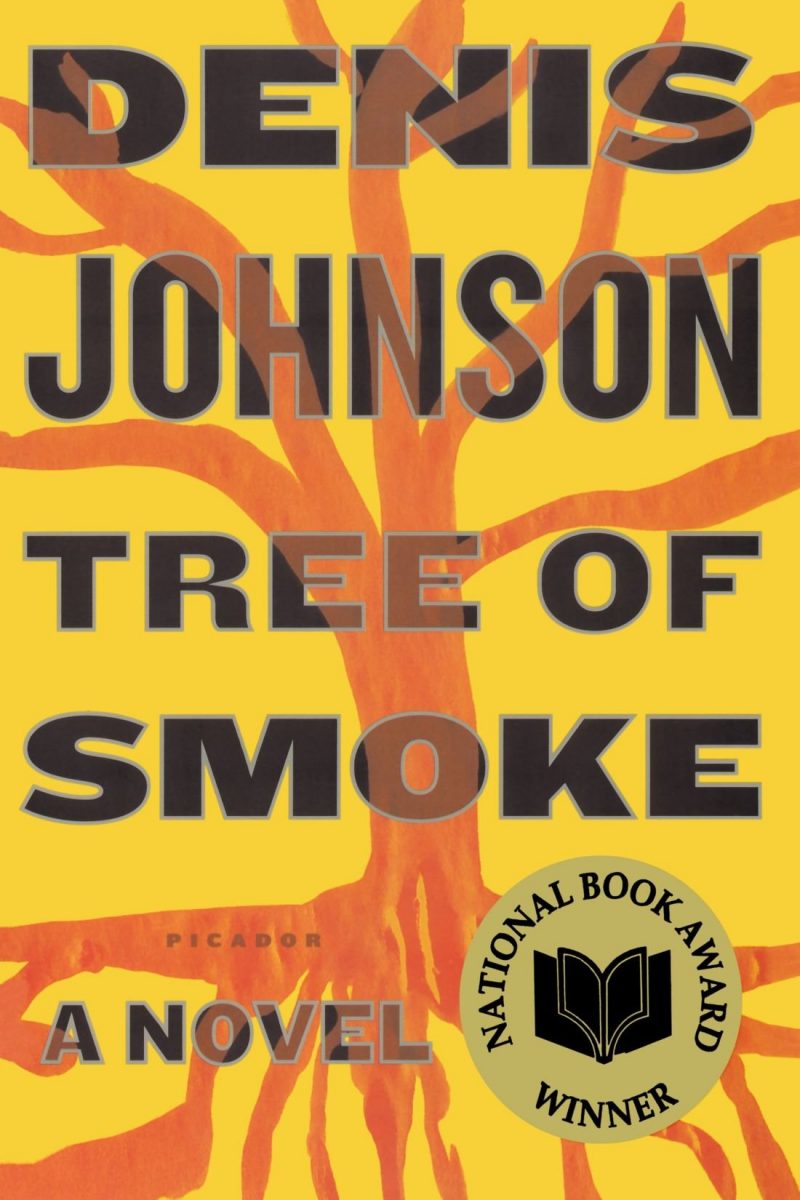Denis Johnson is best known for his slim novel-in-stories Jesus’ Son, which since its publication in 1992 has become something of a young writers’ how-to guide. What tends to get left out of most discussions of that book is that Johnson structured it loosely around the Stations of the Cross. In fact, since the publication of his first novel, in 1983, he has been preoccupied with the paradoxical notions of self-sacrifice and salvation in our modern world—but never before has Johnson’s writing been quite so haunted and harrowing as it is in his massive new novel, twenty-five years in the works.
Tree of Smoke begins in 1963 with the assassination of President Kennedy, only it’s 3 a.m. and we’re halfway around the world, tagging along with Seaman Apprentice William Houston Jr.—the devil in Johnson’s first novel, Angels—as he wades just barely sober through the jungle of Grande Island, in the Philippines. Right away, we’re in trademark Johnson territory: the world as we know it, only not at all. In Angels, “Death is the mother of all beauty,” a line from Wallace Stevens’s “Sunday Morning,” is inscribed over a gas chamber in a New Mexico state penitentiary. In Tree of Smoke, death is everywhere, beauty hallucinatory, and “nothing ain’t exactly nothing no more.” This isn’t the same as saying that nothing matters. Family matters, but only in a sad, haunted kind of way. As Bill Houston’s younger brother, who follows him to Vietnam, says, “Family better count for something. Because nothing else does.”
“You got that right.”
“You ready for a burger?”
“Does the Pope wear a dress?”
Since the beginning of his career, Johnson’s had an ear for the gritty nuances of speech, but the dialogue in this book has the stamp of lived-and-learned life, as if we’re eavesdropping on real people talking real talk, not the fragmented pseudo-speak that afflicts all too many of our avuncular auteurs. In addition to the Houston brothers, we meet spy-in-training Skip Sands, this novel’s “Quiet American,” and Skip’s uncle Colonel F. X. Sands, our Colonel Kurtz. “The Colonel”—whose brother is the bad guy in Johnson’s fourth novel, Resuscitation of a Hanged Man—looms large, but this isn’t a “Vietnam novel.” Sure, Johnson’s read his Dispatches and watched his Apocalypse Now, and Tree of Smoke indeed captures all the sound and fury of the Vietnam era: the deaths of Martin Luther King and R.F.K., the fall of Saigon, and the Tet offensive. As rendered in Johnson’s fractured and phantasmagoric prose, the last will no doubt go down as one of the most savage and vitriolic battle scenes in modern letters.
What really concerns Johnson here is the search for the soul in a world gone to addiction and violence. This becomes especially evident when the narrative abruptly shifts from the Brothers Houston and Skip Sands to Skip’s doppelgänger, Sgt. Jimmy Storm, and his sometime lover, a Canadian nurse named Kathy Jones. Both Storm and Jones are lost souls who rapidly descend into their own personal hearts of darkness, but whereas Kathy strives for salvation, Storm’s bent on self-sacrifice, literally offering himself as “compensation, baby” at a sacrificial bonfire in the remote Malaysian jungle as “from the trees all around came the waterfall sound of scrabbling claws and the curses of demons driven into the void.” Everyone winds up in a prison of some kind, be it physical or spiritual, but in the world according to Denis Johnson, “all will be saved.”





